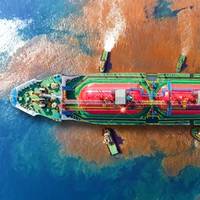Tanker Spills and Preserving OPA 90 Experience

The maritime industry has seen a very long sequence of environmental regulations since the first implementation of MARPOL in the early 1970’s. All of these regulations have very much benefitted the ocean environment and also our industry to some degree. One of those regulations, OPA90, has had an outsized effect to an extent that it may no longer be as effective as it was in recent years due to its own success.Tanker oil spills in the United States have become so rare that people with actual U.S.
ITOPF: Two Large Tanker Oil Spills in 2017
The International Tanker Owners Pollution Federation (ITOPF), which maintains a database of oil spills from tank vessels, recorded two large spills (>700 tonnes) and four medium spills (7-700 tonnes) for 2017. The first large spill occurred in June when a tanker sank in the Indian Ocean with over 5000 tonnes of oil on board. The second incident involved a tanker which sank off the coast of Greece in September spilling about 700 tonnes of oil. Of the four medium sized spills two were recorded in January 2017 in South Asia and Southeast Asia; both resulted from collisions and involved the release of bunker fuel. A third spill was reported in East Asia in August. This also involved bunker fuel and resulted from a vessel grounding in bad weather.
Tanker Oil Spills Notches New 5-year Low
A new five-year low in oil spills from tankers reported by the International Tanker Owners Pollution Federation (ITOPF), as the average for 2010-2014 falls to 1.8 large spills per year. During the year, ITOPF recorded 1 large spill of bitumen (over 3,000 MT) from a tanker in the South China Sea, and 4 medium spills of various oil types, totaling 5 spills of 7 tonnes and over. Interestingly, a number of tanker incidents reported in the media in 2014 involved fire and explosion, where potentially significant quantities of cargoes and bunker fuel burned. The cargoes involved included condensate, diesels and fuel oils. "For the last two and a half decades the average number of incidents involving oil spills from tankers has progressively halved…
Planning, Not Technology, Is Key To Spill Avoidance
Good planning, and not super high technology is the key to fighting tanker oil spills, Ian White, managing director of London-based International Tanker Owners Pollution Federation Ltd. said last week. "There are technological limitations as to what you can do (to control oil spills). He said in a speech most spills from tankers occurred during routine operations such as loading, discharging and bunkering. But bigger spills involving more than 700 tons have resulted from collisions and groundings, he said. "You can use booms and skimmers to concentrate the oil, pick it up and remove it, but it tends to be quite inefficient, especially if the weather is not good," White said.






